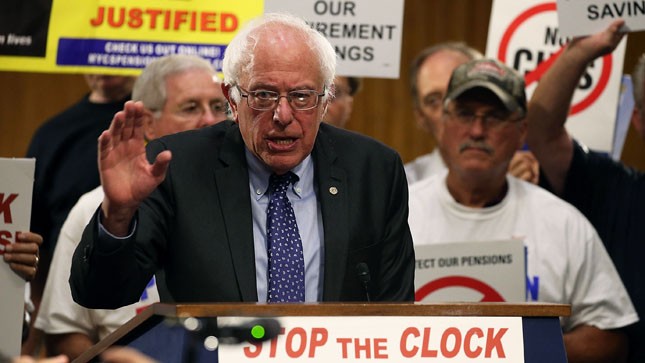
Sen. Bernie Sanders (I-Vt.) has edged ahead of Hillary Clinton in both Iowa and New Hampshire, according to some recent polls, adding new urgency to the question of whether he can extend his surge to the South.
Once the Iowa caucuses and New Hampshire primary are over, Democrats will turn to below the Mason-Dixon line, for the South Carolina primary.
Soon after comes Super Tuesday, which in this cycle has acquired the “SEC primary” nickname because states such as Alabama, Arkansas, Georgia, Tennessee and Texas are among the 11 voting.
All those states look like more hostile territory for Sanders than Iowa and New Hampshire.
A new poll from Quinnipiac University earlier this week put him one point ahead of Clinton in Iowa, 41 percent to 40 percent. In New Hampshire, three recent polls have put Sanders in the lead by significant margins.
The most recent major poll out of South Carolina, in contrast, gave Clinton 54 percent support to a mere 9 points for Sanders. (The poll from the Democratic-leaning Public Policy Polling firm also indicated that Vice President Joe Biden would draw the support of 24 percent of Palmetto State Democrats if he entered the race.)
“By no means does doing well in Iowa and New Hampshire necessarily mean he can become competitive the rest of the way,” said Joe Trippi, a Democratic strategist who served as campaign manager of former Vermont Gov. Howard Dean’s 2004 presidential bid.
A large part of Sanders’s challenge lies in his perceived difficulty in connecting with black voters. Back in June, a CNN/ORC poll showed Sanders winning the support of just two percent of African-American Democrats. In early August, a Fox News poll gave him nine percent support among non-white Democrats.
That is self-evidently a huge problem in states such as South Carolina, where 54 percent of the voters in the 2008 Democratic Primary were black.
“Martin Luther King said a vote is an investment,” said Richard Dickerson, an Alabama-based consultant who has worked with many Democratic candidates. “If Bernie wants our vote, what are we getting for that investment?”
Sanders has moved to address this perceived weakness.
After some of his events were disrupted by protesters from the Black Lives Matter movement, he included a lengthy section on racial justice on his website. And, next week, he will introduce a bill aimed at reforming the criminal justice system.
He also moved to counter criticisms that his team lacks diversity with the hiring of Symone Sanders (no relation), a 25-year-old African-American, as his press secretary in August.
On Thursday, Sanders met in Washington with members of the Congressional Black Caucus.
Sanders aides are also adamant that they have a powerful story to tell about his engagement with civil rights, which includes participating in the 1963 March on Washington at which King delivered his famous “I Have A Dream” speech, and being arrested while a student at The University of Chicago for protesting housing segregation.
“This is a kid who grew up in a tenement in Brooklyn, who as a young college student was a very serious civil rights activist,” said Tad Devine, a senior adviser to Sanders. “This is somebody who has got a real commitment to civil rights. We have a lot to say about him.”
But the doubters worry that there is something in Sanders’s personal style that could make him a poor fit for the South. He is in many ways the archetypal older, white Northeastern left-winger, right down to his still-strong Brooklyn accent.
“It’s unclear how his personality is going to play in the South, regardless of his record,” said Trippi. “I’m not putting anything on him, it’s just a weird thing. With Dean, yes, we came from Vermont and we didn’t have a lot of history or interaction with minority voters — but they really liked his energy and his willingness to confront 'The Man,' as they saw it. Whatever that is, Sanders doesn’t have it. I can’t explain what it is or what it isn’t, but he just doesn’t have it.”
Dickerson made a similar point in a different way: “Bernie’s problem is that he has no connection,” he said. “When he goes to a black church, he will stick out like a sore thumb.”
The battle beyond Iowa and New Hampshire will not just be about drawing support from non-white Democrats. It will also mark a shift from close-up retail politicking to a broader stage. The battle for the 11 states voting on Super Tuesday will be fought in part through TV advertising — a famously expensive undertaking, and one that might be expected to offer the deep-pocketed Clinton team major advantages.
But Sanders aides believe that early successes could change everything. Victory in Iowa or New Hampshire, or both, could turn on a gusher of contributions, enabling him to remain competitive, they say.
“To have a realistic chance of winning the nomination, we have to premise it on early success,” said Devine. Seeking to contrast the Sanders campaign with that of Clinton, he added that “they are going to people and asking them to max out. We are going to people and asking them for five bucks.”
While Devine did not downplay the importance of Southern states — or the importance of attracting backing from black and Latino Democrats — he also noted that several of the states voting on Super Tuesday are outside the South and a more obvious demographic fit for Sanders. He named Minnesota, Massachusetts and Colorado in this category, as well as Vermont itself.
As Sanders has strengthened in recent weeks, much media attention has focused on the South as a “firewall” for Clinton.
“If you’re talking about having a firewall, that means you need a firewall,” said Devine. “We are looking to create a prairie fire.”
- Publish my comments...
- 0 Comments
